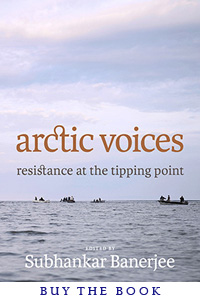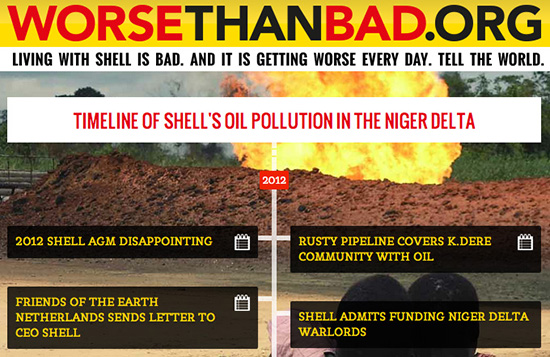
What do Arctic drilling and drone killing have in common? They are both being decided by Barack Obama without public debate.
Also oil is a common ground -- drilling will produce it and drones will burn it -- to kill people, animals, and habitats. Both issues must be debated publicly. You have read about drone killing, I'll tell you about Arctic drilling.
 A May 24 front-page article in the New York Times made clear that Obama got personally involved and fast-tracked Shell's drilling permits. Shell did their part by launching a massive ad campaign and lobbying hard in the Beltway, while the company's Alaska executive Pete Slaiby according to the Times "traveled to remote villages and chewed raw whale meat while listening to local concerns." None of this was a surprise to us fighting this issue for years now. I have written extensively to stop Shell's Arctic drilling since 2010; before that I used to talk about it in my lectures; and recently I edited an anthology Arctic Voices: Resistance at the Tipping Point that will be published later this month. I'd urge you to get a copy of the book and please read the thirty-nine stories, including by Iñupiat activists Robert Thompson, Rosemary Ahtuangaruak, Earl Kingik, and Caroline Cannon, whose communities and culture would be most severely impacted by Shell's Arctic drilling. For her courageous activism Caroline Cannon won the prestigious Goldman Environmental Prize this year. On June 21, I'll give the book-launch lecture in Seattle at the Town Hall hosted by the Seattle Arts & Lectures; and Shell's drill ships will be on their way from Seattle to the Arctic to begin drilling as early as mid July, or after a slight delay in August if heavy ice persists.
A May 24 front-page article in the New York Times made clear that Obama got personally involved and fast-tracked Shell's drilling permits. Shell did their part by launching a massive ad campaign and lobbying hard in the Beltway, while the company's Alaska executive Pete Slaiby according to the Times "traveled to remote villages and chewed raw whale meat while listening to local concerns." None of this was a surprise to us fighting this issue for years now. I have written extensively to stop Shell's Arctic drilling since 2010; before that I used to talk about it in my lectures; and recently I edited an anthology Arctic Voices: Resistance at the Tipping Point that will be published later this month. I'd urge you to get a copy of the book and please read the thirty-nine stories, including by Iñupiat activists Robert Thompson, Rosemary Ahtuangaruak, Earl Kingik, and Caroline Cannon, whose communities and culture would be most severely impacted by Shell's Arctic drilling. For her courageous activism Caroline Cannon won the prestigious Goldman Environmental Prize this year. On June 21, I'll give the book-launch lecture in Seattle at the Town Hall hosted by the Seattle Arts & Lectures; and Shell's drill ships will be on their way from Seattle to the Arctic to begin drilling as early as mid July, or after a slight delay in August if heavy ice persists.
According to Foreign Policy magazine, "Barack Obama has become George W. Bush on steroids." The article makes this reference with regard to Obama's drone killing, but perhaps a similar thing could be said about his Arctic drilling that we must condemn.
We fought hard and defeated Bush's repeated attempts to sell off the Arctic National Wildlife Refuge to Big Oil -- the most biodiverse conservation area in the circumpolar north that also supports two indigenous communities -- the Gwich'in and the Iñupiat. But even during the super-oily Bush-era the National Research Council conducted an extensive and first of its kind Arctic study that was chaired by renowned scientist Professor Gordon Orions of the University of Washington in Seattle. The study concluded with a 288-page book Cumulative Environmental Effects of Oil and Gas Activities on Alaska's North Slope published by the National Academies Press (download free PDF). For the first time, all of us could understand in plain language the cumulative effects of more than three decades of oil drilling on land -- on the ecology and human cultures of Arctic Alaska.
Know this now: despite repeated appeals by the Iñupiat people and conservationists, the Obama administration refused to do an Environmental Impact Statement, a thorough public process (italics added to emphasize key issues) -- on the Beaufort and Chukchi Seas where Shell's drilling would take place. Also, know that no comprehensive scientific study on the Arctic Ocean has been conducted by this administration, yet the most dangerous form of drilling is about to take place there -- no one knows how to clean up oil from underneath the ice in the extremely harsh environment of the Arctic. The administration has rubber-stamped Shell's permits after permits through a fast-track process; and while doing that tried to silence a top federal Arctic scientist Dr. Charles Monnett, who had exposed threat to polar bears caused by climate change, by suspending him last year, to promote Arctic drilling -- The Guardian reported. Because of sustained complaints from Public Employees for Environmental Responsibility the administration's attempt backfired, and instead the head of the Bureau of Ocean Energy Management, Regulation and Enforcement (BOEMRE) -- the agency that suspended Monnett -- came under investigation.
There is no infrastructure in the Arctic to respond to a spill. The nearest Coast Guard station is more than 1,000 miles away. During the Bush administration several federal administrators responsible for regulating offshore oil drilling operations "had used cocaine and marijuana, and had sexual relationships with oil and gas company representatives" -- The New York Times reported. It was bad news but easy to understand.
It seems to me that a far more sophisticated approach is taking place about offshore drilling safety and regulations -- monkeys are now in charge of protecting bananas! On March 7, The Hill reported, "Charlie Williams, a former scientist at Shell, will become the executive director of the Center for Offshore Safety." The fine-named center was formed by Big Oil in the aftermath of BP's Deepwater Horizon catastrophe in the Gulf of Mexico. Charlie Williams also serves in the BOEMRE's Ocean Energy Safety Advisory Committee. He had worked for Shell for 40 years, and since 2005 was chief scientist -- Well Engineering and Production Technology for Shell worldwide. No one has to sleep with anyone and create a PR mess -- for the government and the corporation, but the cycle is complete -- the Center for Offshore Safety (with a former top Shell employee at the helm) will no doubt assure the President that all is well in Shell's well, "Don't worry be happy" -- while oil seeps underneath the Arctic ice for nine months, and Coast Guard employees sleep a 1,000 miles away. A perfect plan to kill the Arctic Ocean has been devised by Obama and Big Oil.
The Iñupiat activists have pointed out that Shell is a foreign oil company that will destroy their homeland and make huge profits. Indeed, Shell is a multinational company that is headquartered in the Netherlands. Shell, a foreign company to the Ogoni people has already destroyed their homeland, in the Niger delta. Unlike BP's Deepwater Horizon that generated tremendous public outcry, we hear little to nothing in the U.S. media and press about Shell's atrocities in the Niger delta.
"The UN Environment Programme has announced that Shell and other oil firms systematically contaminated a 1,000 sq km (386 sq mile) area of Ogoniland, in the Niger delta, with disastrous consequences for human health and wildlife. Nnimmo Bassey, chair of Friends of the Earth International and director of Environment Rights Action in Nigeria said the pollution had decimated the livelihoods of the Ogoni people." -- The Guardian reported in an August 4, 2011 article.

Timeline of Shell's oil pollution in the Niger delta (first few items).
Courtesy: worsethanbad.org/Friends of the Earth Netherlands.
On May 11, I received an email from Valesca Mulder of the Friends of the Earth Netherlands/Milieudefensie. She wrote, "You have written various interesting article about Shell. That is why I think that the brand new international campaign of Friends of the Earth might interest you. With our new campaign, called Worse Than Bad (www.worsethanbad.org), we demand immediate action from Shell to take responsibility for the pollution they have caused. As you probably know, we have started a legal case against Shell Nigeria and its parent company in the Netherlands. It is the first time in history that a Dutch company must appear before a Dutch court to account for damage caused abroad." I'd urge you to please visit the amazingly put together website worsethanbad.org, spend some time, and share with others what you find. There you will see as Valesca Mulder wrote to me, "all the facts in a unique timeline we have created, a historical overview of Shell activities in Nigeria." A May 21 press release from the Friends of the Earth International states:
"On the eve of the annual general meeting of oil giant Shell, Friends of the Earth International announced that it will deliver to Shell CEO Peter Voser some 70,000 signatures of people who want Shell to start cleaning up its mess in the oil-rich and highly polluted Niger delta in Nigeria. Friends of the Earth Netherlands campaigners will stand outside the May 22 Shell meeting and offer to Shell shareholders the opportunity to taste a sip of contaminated water from the Niger delta: water with hydrocarbons such as benzene, but also other hazardous chemicals such as barium. This is the only 'drinking' water, which many residents of the Niger delta can drink. Over the past decades Shell let tens of millions of litres of oil to stream into the Niger delta by refusing to properly maintain the pipeline network. Moreover, the AngloDutch multinational still does not comply with the Nigerian ban on gas flaring. Because Shell is doing so little, Friends of the Earth Netherlands / Milieudefensie started an international campaign which members of the public can support at www.worsethanbad.org."
The press release includes a quote by Nnimmo Bassey:
"Shell continues to reap obscene profits from the oil fields of Nigeria at the expense of the lives and the livelihoods of the poor people. As we speak Shell is intensifying its poisoning of the environment and the peoples of the region. By our records Shell had over 200 oil spills in 2011 alone and the 2012 tally is rising already. Shell must stop the poisoning and start cleaning up its mess right now."
On Monday over a phone conversation Leah Donahey, Western Arctic and Oceans Program Director at the Alaska Wilderness League told me that the conservation groups "delivered more than one million comments to oppose Shell's Arctic drilling" to the Obama administration on May 14; they are "working on organizing vigils with Iñupiat people when Shell's ships show up in the Arctic"; and "legal suits to oppose Arctic Ocean drilling will continue"; and they will "raise visibility about the issue."
Toxic gas flaring goes on in the Niger delta. Toxic gas flaring goes on in the Arctic tundra -- as told by Rosemary Ahtuangaruak in a powerful and painful story in the Arctic Voices anthology. We cannot talk about Deepwater Horizon without also talking about Exxon Valdez. Similarly, from now on we must always put two words -- Arctic and Niger -- together when we talk about Shell's drilling. Sustained shaming of cruel acts committed or about to be committed by corporations and governments is necessary if we are to hope for a healthy society.
Crossposted with ClimateStoryTellers.org
